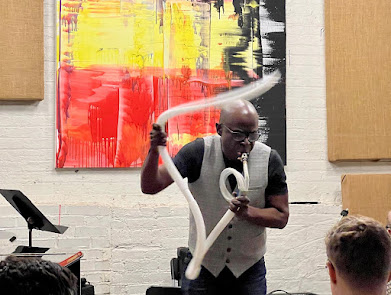Sydney Sheldon's poignant quote, "A blank piece of paper is God's way of showing you how hard it is to be God," deeply resonates with me as a writer and an improvisor. Allow me to elaborate on the meaning this quote holds for me. As I see it, a blank page serves as a metaphor for writer's block—a creative artist's ultimate nemesis. While the process of refinement can transform subpar writing or composing into something worthwhile, a blank page offers no such potential. Its emptiness stands as a daunting challenge. Or as I think of it: creative ground zero.
Let's delve into the reasons behind the existence of these barren sheets, devoid of the illuminating words and vibrant tones we aspire to imbue them with. A prominent contributor to writer's block is the entrapment of a rigid, agenda. When one becomes fixated on executing what the mind (or ego) dictates, the natural, instinctive flow of creativity is stifled. This is where the notion of "God" enters the discourse.
Now, let's decipher this metaphorical language further. In this context, "God" symbolizes the enigmatic currents of creativity, possessing an autonomous momentum. In other words, it has a life of its own. As a writer, composer or improviser, embracing the role of a vessel and/or conduit for these creative forces, rather than assuming the position of a creator, becomes paramount. Failure to do so inevitably results in the dreaded blank page and sometimes a blank creative spirit.
Should you aspire to assume the role of a "creator" akin to a deity, by all means, take the audacious leap. Nevertheless, the multitude of blank pages scattered across the creative landscape serves as a testament to the futility of this pursuit.
In essence, Sheldon's words encapsulate a powerful lesson—that we should humble ourselves to creativity's mysterious power. It urges us to yield to the creative forces at play and recognize our role as mere facilitators. By doing so, we shatter the shackles of the blank page syndrome and allow the symphony of words and tones to flow through us, unimpeded.
How? How do we do this? I wish that I could offer a full proof strategy. But I will say this.
- Humble yourself to the process.
- Look for cues, not definitive answers.
- Follow a compass, not a map.
- Recognize that not all creative work follows a linear path, sometimes it follows its own unique path.
Give it a try. Actually, don't try. Just let it be what it is!












